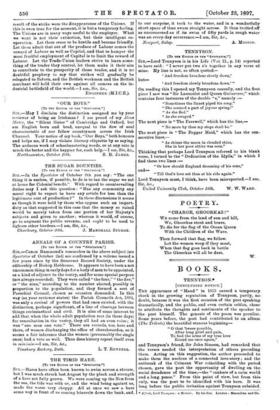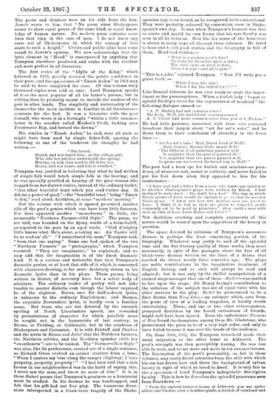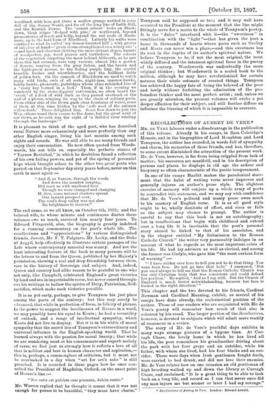BOOKS.
TENNYSON.* [CONCLUDING NOTICE.] THE appearance of " Maud " in 1855 caused a temporary check in the growing reputation of Tennyson, partly, no. doubt, because it was the first occasion of the poet speaking dramatically, and the public, and even certain critics, chose to attribute the thoughts and sentiments of the speaker to the poet himself. The genesis of the poem was peculiar. Some years before, the poet had contributed to an album (The Tribute) the beautiful stanzas beginning-
" 0 that 'twere possible, After long grief and pain, To feel the arms of my true love Round me once again," and Tennyson's friend, Sir John Simeon, had remarked that/ the verses needed the interpretation of others preceding them. Acting on this suggestion, the author proceeded to. make them the nucleus of a connected love-story ; and the outbreak of the Crimean War coinciding with the period chosen, gave the poet the opportunity of dwelling on the- social decadence of the time,—the "cankers of a calm world and a long peace." From this point of view, but from this only, was the poet to be identified with his hero. It was long before the public irritation against Tennyson subsided.
• Tired, Lord Toanysoa a Memoir. By his Son. London : Macmillan and Co.
The poets and thinkers were on his aide from the first. Jowett wrote to him that "No poem since Shakespeare seems to show equal power of the same kind, or equal know.
ledge of human nature. No modern poem contains more lines that ring in the ears of men. I do not know any verse out of Shakespeare in which the ecstasy of love soars to such a height." Critics and public alike have come round to Jowett's opinion. We now acknowledge that the lyric element in "Maud" is unsurpassed by anything that Tennyson elsewhere produced, and ranks with the loveliest and most perfect in all literature.
The first series of the "Idylls of the King," which
followed in 1859, greatly restored the public confidence in their poet; and the appearance of "Enoch Arden" in 1864 may be said to have completed the cure. Of this volume sixty thousand copies were sold at once. Lord Tennyson speaks of it as the most popular of all his father's poems ; but in writing thus he probably meant to include the readers of the poet in other lands. The simplicity and universality of the theme—for the main incident is familiar in all literatures— accounts for the fact. It was a favourite with the poet himself, who wrote it in a fortnight "within a little summer-
house in the meadow called Maiden's Croft, looking over Freshwater Bay, and toward the downs."
His similes in "Enoch Arden," he said, were all such as might have been used by simple fisher-folk, quoting the
following as one of the tenderest (he thought) he had written :— " She heard,
Heard, and not heard him ; as the village girl,
Who sets her pitcher underneath the spring, Musing on him that used to fill -it for her, Hears, and not hears, and lets it overflow."
Tennyson was justified in believing that what he had written of simple folk would touch simple folk in the hearing; and he was specially gratified at hearing of the poor woman who begged from her district visitor, instead of the ordinary leaflet, "that other beautiful tract which you read t'other day. It did me a power of good,"—the "beautiful tract" being "Enoch A rden," read aloud, doubtless, at some "mothers' meeting."
But the volume with which it opened presented another side of the poet's genius which can have been little foreseen. For here appeared another " monodrama " in little, the memorable "Northern Farmer—Old Style." The poem, we are told, was founded on the dying words of a farm-bailiff, as reported to the poet by an aged uncle. "God A'mighty little knows what He's about, a-taking me. An' Squire will be so mad an' all." "I conjectured the man," Tennyson said, "from that one saying." Some one had spoken of the two "Northern Farmers" as "photographs," which Tennyson resented. "They are imaginative," he explained; and we may add that the imagination is of the finest dramatic kind. It is a curious and noticeable fact that Tennyson's dramatic genius, or at least that side of it which is concerned with character-drawing, is far more decisively shown in his dramatic lyrics than in his plays. These poems, being written in dialect, of necessity have but a select body of
admirers. The ordinary reader of poetry will not take trouble to master dialects, even though the labour required be of the slightest. Burns, save for half.a.dozen lyrics, is unknown to the ordinary Englishman; and Barnes, the exquisite Dorsetshire lyrist, is hardly even a familiar name. But those who are not deterred by the uncouth spelling of North Lincolnshire speech, are rewarded by presentations of character for which parallels must be sought, not in the humourists of last century, in Sterne, or Fielding, or Goldsmith, but in the creations of Shakespeare and Cervantes. It is with Falstaff and Shallow and the nurse in Romeo and Juliet that the Northern farmers, the Northern cobbler, and the Northern spinster (with her
"sweethearts ") are to be ranked. The "Farmer—New Style" was also, like its predecessor, created out of a single sentence, as Richard Owen evolved an extinct creature from a bone. "When I canters my 'erse along the ramper [highway] I 'ears proputty, proputty, proputty !" "I had been told that a rich farmer in our neighbourhood was in the habit of saying this. I never saw the man, and know no more of him." It is in these dialect poems that Tennyson's greatness as a humourist must be studied. In his dramas he was handicapped, and felt that his gift had not free play. The humorous diver-
sions interspersed in a blank-verse tragedy of the Shake-
spearian type were bound, as he recognised, to be conventional. They were probably coloured by convention even in Shake- speare's own day. It was when Tennyson's humour was free to create and mould its own forms that his rare faculty was seen in all its richness. How fine his sense of the humorous is shown in many ways all through these volumes. He loved to hear and to tell good stories, and the biography is full of them. Hood had written,—
" What is a modern poet's fate ? To write his thoughts upon a slate ; The critic spits on what is done. Gives it a wipe—and all is gone."
"This is a joke," rejoined Tennyson. "Now I'll write you a grave truth :- 'While I live, the owls !
When I die, the GHOULS ! !!' "
Like Samuel Johnson, he was ever ready to snub the imper- tinent or the presumptuous. When a foolish lady "began to uphold Shelley's views for the regeneration of mankind" the following dialogue ensued :—
"A. T. Shelley had not common-sense !
The Lady. Well, but had Christ common-sense ?
A. T. Christ had more common-sense than you or I, Malani."
He had little patience, moreover, with those who scattered broadcast their jargon about "art for art's sake," and he
drove them to their conclusion of absurdity in the fierce lines :—
" Art for art's sake ! Hail, truest Lord of Hell!
Hail, Genius, Master of the moral Will ! 'The filthiest of all paintings painted well Is mightier than the purest painted ill ! ' Yes, mightier than the purest painted well, So prone are we toward the broad way to Hell!"
The poet had a keen eye for foolish and mischievous para- doxes, of whatever sort, moral or msthetic, and never failed to put his foot down when they appealed to him for his countenance :—
"I have just had a letter from a man who wants may opinion as to whether Shakespeare's plays were written by Bacon. I feel inclined to write back : Sir, don't be a fool.' 'The way in whieh Bacon speaks of Love would be enough to p. 'vu that he was not Shakespeare. I know not how, but martial men are given to Love. I think it is but as they are given to wine, for perils commonly ask to be paid in pleasures.' How could a man with such an idea of Love write Romeo and Juliet ? "
But doubtless crushing and complete arguments of this nature would be wasted upon the supporters of the heresy in question.
The space devoted to criticism of Tennyson's successive dramas is perhaps the least convincing portion of the biography. Whatever may justly be said of the splendid tone and the fine literary quality of these works, they must necessarily, in spite of fine passages, share the fate of all blank-verse dramas written on the lines of a drama that reached its climax nearly three centuries ago. The plays are noble contributions to the imaginative treatment of English history, and as such will always be read and admired ; but it was only by the skilful manipulation of a
trained stage-manager that one of them—Becket—was enabled to live upon the stage. Sir Henry Irving's contribution to the criticism of the subject was not of equal value with his other services to the play. Becket he pronounced to be a finer drama than King John,—an estimate which, save from
the point of view of a leading tragedian, is hardly worth entertaining. These, and one or two other extravagances, prompted doubtless by the fervid enthusiasm of friends,
might well have been spared. Even the unfortunate Promise of May found its champions, among them Mr. Gladstone, who pronounced the piece to be of a very high order, and only to have failed because it was over the heads of the audience.
On June 30th, 1892, the Tennyson household made their usual migration to the other home at Aldworth. The poet's strength was then perceptibly waning. He was less able to walk, and he sat more and more in his summer-houses. The fascination of the poet's personality, as felt in these volumes, may easily divert attention from the skill with which his eon has drawn here and there the background of sylvan beauty in sight of which he loved to dwell. It is only fair to cite a specimen of Lord Tennyson's indisputable descriptive faculty. This is how he describes the splendid panorama seen from Blackdown :—
"From the eastern summer-house at Aldworth you see under alders and birches, over a heather-glade, a stretch of cornland and woodland, with here and there a mellow grange nestled in some dell of the Sussex Weald, and far off the long line of Leith Hill, and the Kentish Downs. The 'sunset arbour' looks on Black- down, bleak ridges fledged with pine,' or northward, beyond promontories of beech and holly, beyond the red roofs of
Hasle- mere, up to the bold form of Hindhead. Latterly his walks were confined to what he called my demon-haunted hill '; with groves of oak close at hand= grain storm-strengthened on a windy site ' ; —and larch and chestnut clothing the more distant slopes, haunts of woodpecker, jay, wood pigeon and turtledove. The colours of the vegetation carpeting the moor behind Aldworth, as he saw them this last autumn, were very various, almost like a garden of flowers, varying from the gray lichen, and the brown and
the light-green mosses, to the fading purple ling, the scarlet bramble bushes and whortleberries, and the brilliant fields of golden fern. On the summit of Blackdown we used to watch many wild birds, owls of all sorts, night-jars, sparrow-hawks, hobby-hawks, pheasants, partridges whose cries reminded him of a rusty key turned in a lock.' Then, if in the evening we wandered by the stone-diggers' cart-tracks, we often heard the 'swish' of a flock of wild duck as they passed overhead, or the wail of a plover, winging its way to the chain of solitary pools. From either side of the Down gush clear fountains of water, some of them at this time hidden by the soft wool of the autumn willow-herb.' These delighted him. Some flow down to join the Wey, others wend their course to the Arun, but the great want of our views, as be said, was the sight of 'a full-fed river winding through the landscape."
It is pleasant to think of the aged poet, who has described rural Nature more exhaustively and more perfectly than any other English singer, living his last months among such sights and sounds. He was still able to see many friends and enjoy their conversation. He now often quoted from Words- worth, his son tells us, especially the pathetic stanza of "Yarrow Revisited," in which he doubtless found a reflection of his own failing powers, and yet of the spring of perennial hope which brought solace to the other two great poets who parted on that September day sixty years before, never on this earth to meet again :— " And if, as Yarrow, through the woods
And down the meadow ranging, Did meet us with unaltered face
Though we were changed and changing If, then, some natural shadows spread
Our inward prospect over, The soul's deep valley was not slow Its brightness to recover."
The end came, as we all know, on October 6th, 1892; and the beloved wife, to whose minute and continuous diaries these volumes owe so much, survived him nearly four years. To Edward Fitzgerald, also, the biography is greatly indebted for a running commentary on the poet's whole life. The recollections and " appreciations " by various distinguished friends, Jowett, Mr. F. T. Palgrave, Mr. Lecky, and the Duke of Argyll, help effectively to illustrate certain passages of the Life where contemporary material was scanty. And not the least interesting feature of the book to many persons will be the letters to and from the Queen, published by her Majesty's permission, showing a real and deep friendship between them, rare in the history of Sovereign and subject. And, indeed, Queen and country had alike reason to be grateful to one who not only, like Campbell, celebrated England's great victories by land and sea in imperishable verse, but never ceased through- out his writings to hallow the spirits of Duty, Patriotism, Self- sacrifice, which make such victories possible.
It is as yet early, perhaps, to give Tennyson his just place
among the poets of the century; but this may surely be advanced, that while in perfection of form, in felicity of phrase, in the power to suggest the lovelinesses of Nature in a word, we may possibly have his equal in Keats ; he had a versatility of outlook, and a range of intellectual sympathy, which Keats did not live to display. But it is in his width of moral sympathy that the secret lies of Tennyson's extraordinary and universal influence in the English-speaking world. That he burned always with the passion for moral beauty ; that while we are wondering most at his consummate and superb melody of verse, we feel just as strongly how it reflects a love of all that is noblest and best in human character and aspiration,— this is, perhaps, a commonplace of criticism, but it must not be overlooked in a day when "art for art's sake" is still preached. It is recorded in these pages how he once con- sulted the President of Magdalen, Oxford, on the exact point of Horace's line :— " Nec satis eat pulchra ease poemata, dulcia sunto."
Mr. Warren replied that he thought it meant that it was not enough for poems to be beautiful, "they must have charm." Tennyson said he supposed so too ; and it may well have occurred to the President at the moment that the line might fittingly serve for a motto to the whole of Tennyson's poetry. It is the " dulce " interfused with it—the " sweetness " in combination with the "light "—that has given the poet a home in thousands of hearts where poets such as Shelley and Keats can never win a place,—and this sweetness has its root in the depths of its author's spiritual nature. We believe Tennyson to be, if not the most original, the most widely diffused and the intensest spiritual force in the poetry of the century. Wordsworth was undoubtedly the more original thinker ; but Wordsworth is a sealed book to the million, although he may have revolutionised for certain natures their whole estimate of created things. Tennyson has achieved the happy fate of being the beloved of the poor and lowly without forfeiting the admiration of the pro- foundest thinker and the most perfect artist ; and, unless we are greatly mistaken, the present volumes will evoke a yet deeper affection for their subject, and still further diffuse an influence the blessing of which it is impossible to overrate.












































 Previous page
Previous page